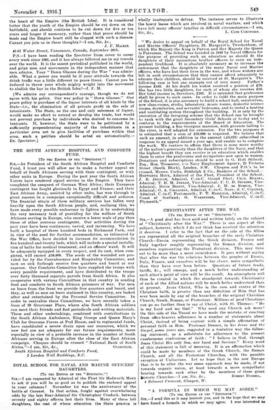CHRISTIANITY AFTER THE WAR.
[To THE EDITOR OP THE " SPECTATOR."] SIR, —A good deal has been said and written lately on the subject of " Christianity after the War." There is one aspect of this subject, however, which I do not think has received the attention it deserves. I refer to the fact that on the side of the Allies are represented all the original branches of the early Christian Church—Russia representing the Greek division, France and Italy together roughly representing the Roman division, and ourselves representing- the Protestant division. This may turn out to be more than a mere coincidence. It goes without saying that after the war the relations between the peoples of Russia, Italy, France, and ourselves will be far closer, more sympathetic than they have ever been before. Questions of future trade, tariffs, &c., will emerge, and a much better understanding of each other's point of view will be the result. An atmosphere will thus be created in which the standpoint towards Christianity of each of the Allied nations will be much better understood than at present. Jesus Christ, Who is the sum and centre of the Christian faith, is greater than any definition of Him that has ever been made by any of the branches of the original Christian Church, Greek, Roman, or Protestant. Millions of good Christians can go no further than to say of Christ, with St. Thomas : " Ho is my Lord and my God." Why need any Church ask more? On this side of the Tweed we have made the mistake of exacting from office-bearers adherence to a number of statements about Christ, instead of being content with a simple affirmation of personal faith in Him. Professor Denney, in his Jesus and the Gmpel, some years ago, suggested in a tentative way the follow- ing statement, as a substitute for adherence to the present cumbersome confessions of faith : " I believe in God, through Jesus Christ His only Son, our Lord and Saviour." Every word of this statement is full of meaning. It is an affirmation which could be made by members of the Greek Church, the Roman Church, and all the Protestant Churches, with the possible exception of Unitarians. Let us hope that in the new Europe that is to be after the war some approach may be made, if not towards organic union, at least towards a more sympathetic bearing towards each other by the members of these great historic Churches.—I am, Sir, &c., Rosser RUSSELL, 4 Belmont Crescent, Glasgow, W.














































 Previous page
Previous page